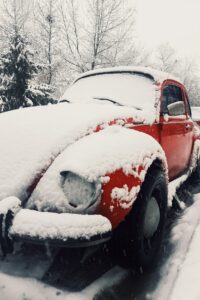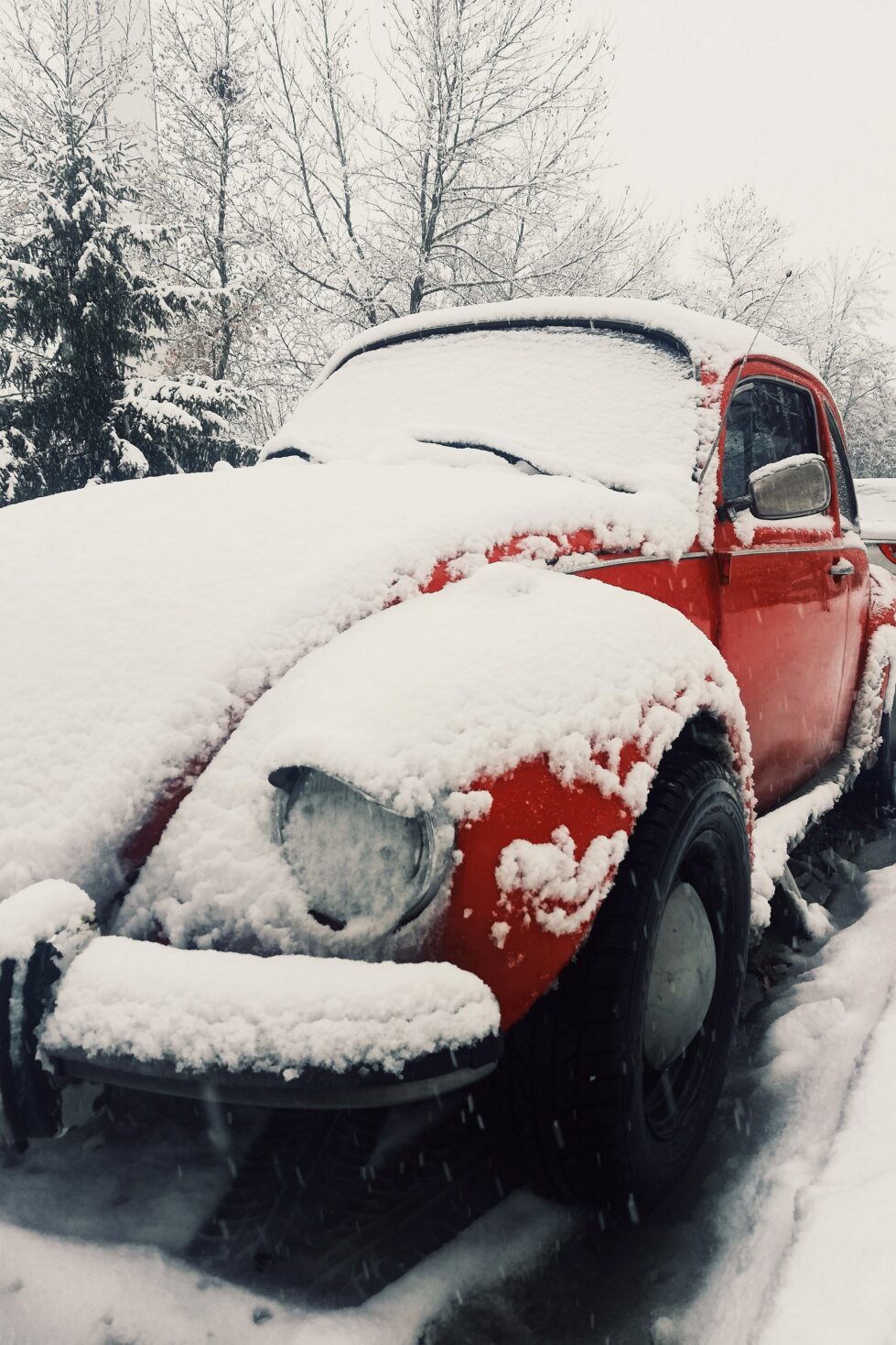

Winter weather like this could be here faster than we think. These tips can help you prepare your car for the cold. (Photo courtesy of Damla Ozkan, Unsplash Media)
Colder weather is fast approaching and although you may have prepared your house and garden, there are things you need to do to protect your vehicle during the winter season. These tips can not only help you protect your vehicle’s engine, but also the exterior.
“Winter weather can be hard on your engine due to several reasons,” Casey Greening of Meineke Milford said. “Firstly, cold temperatures can cause the engine oil to thicken, making it more difficult for it to flow smoothly and reach all the necessary engine components. This can lead to increased engine wear and tear. Additionally, cold temperatures can put more strain on the battery and make it harder for the engine to start. Cold weather can also cause fluids to freeze, such as coolant or fuel lines, which can result in engine damage. It is important to take precautions such as using the appropriate oil viscosity, ensuring proper coolant levels, and allowing the engine to warm up before driving to minimize the impact of winter weather on your engine.”
Failing to prepare your car for winter can lead to several issues. Battery problems can occur as cold temperatures drain the battery faster and make it harder for the engine to start. Before the cold weather hits, make sure your battery is fully charged and in good condition.
“Cold weather can cause the air pressure in your tires to drop, leading to decreased traction and handling,” Greening said. “It’s essential to check and maintain the correct tire pressure throughout winter. If you don’t use the right antifreeze or windshield washer fluid, they can freeze and potentially damage your engine or impair your visibility respectively. Cold temperatures can put extra strain on your car’s starter and ignition system, potentially causing them to malfunction. Without proper preparation of your windshield and wipers, you may face difficulties removing ice from your windshield or have frozen wipers, affecting visibility.”
Greening suggested having your car serviced before the extreme winter weather arrives. A full winterization would include checking the battery, tires, fluid levels and using appropriate winter-grade fluids. Another suggestion is to keep an emergency kit in your vehicle that includes ice scrapers, extra warm clothing and blankets should an emergency arise.
“Certain preparations for your car in winter should ideally be done by a professional, while others can be done by the owner,” Greening said. “For instance, things that should be done by a professional include battery inspection and testing as professionals can check the health of your car battery and ensure it’s functioning optimally in cold weather. Antifreeze/coolant check and flush is another task you should leave to the experts since they can examine the coolant system, test the mixture for the appropriate freeze protection, and flush it if necessary. Have a professional check your tires and rotate them. It is also recommended to have a professional inspect your brake system, including brake pads, rotors, and fluid, to ensure everything is in good working order.”
Tasks that can be performed by the vehicle owner include check and topping off fluids, such as windshield wiper fluid, engine oil and transmission fluid simply by using the instructions in the car’s manual. Owners can also clean and lubricate door seals to help avoid freezing as well as replacing wiper blades. Regularly check exterior lights and replace any bulbs that are dim or no longer working as winter weather can often lead to low visibility.
Your car’s engine is not the only thing that needs attention in the winter, however. Brian Parker of Waves Car Wash in Milford explained that it is important to protect the exterior of your car as well.
“Winter weather isn’t hard on a vehicle at all, it is the salt and ice melters that we put on roads to keep ice from forming whenever there are freezing temperatures or snow. These salts can cause rust/corrosion to take hold anywhere there is exposed metal,” Parker said. “A chip in the paint, the underside of the car, even in the engine bay. These salts can also get into all the little nooks and crannies in the body work or where there are fasteners on the underside of the vehicle, especially when it is mixed with water and turns into a mist (road spray). This is why regularly washing your car at a car wash is better than washing it at home. We have underbody sprays that help to get into those unseen areas to wash off all that salt. Our top two packages, the Tidal Wave and Big Kahuna, even include a second underbody spray that is a Rust Inhibitor/Salt Neutralizer.”
Failure to protect your vehicle exterior could lead to major problems eventually, Parker explained that corrosion can cause important parts of the car to fail sooner than they should.
“The second thing that causes damage is improperly clearing snow or ice from your car’s exterior. We’ve seen many folks come in with scratches from using a broom or some other stiff bristle brush to clear the snow off of their car,” Parker said. “It is always best to start your car and let it warm up the surface of the car first and then use a soft, clean item like a snow brush to remove the snow carefully. Never use something solid to remove snow or ice from the cars paint.”
One way to prevent damage to the surface of your car is by washing it regularly, especially if there is salt or brining solution on the roadways. Parker explained that this should happen as soon as possible after the storm.
“It is best to not let it build up over a few weeks as it may take a few washes to get all of it off if you have a huge amount of salt built up on your car. Keep in mind, what you see on the sides of your car from road spray is also on the underside of your vehicle where all the important bits are that keep your car running smoothly,” Parker said. “This is where our Unlimited Membership really shines! With our Unlimited Membership, you can come in the very next day after your car is covered with Salty Road Spray, and then again, the next day, and the next…”
Parker suggests using an automated car wash in the winter rather than washing at home as the underside of the vehicle will also be coated with salt, making it impossible for someone at home to remove all of the corrosive material.
“Sure, this can be done by the owner but it’s normally a bit cold outside to do it yourself, and most car owners don’t have a means of spraying off the underside of the car,” Parker said. “Also, having items like wax applied in a car wash adds some protection to your paint.”
Meineke in Milford is located at 10 Northwest Front Street and they are open Monday through Friday from 7:30 AM to 6 PM and Saturday from 7:30 AM to 4 PM. Contact them at 302-503-0177. Waves Car Wash is located at 215 Arenson Drive and are open Monday through Friday from 8 AM until 6 PM, Saturday from 8 AM to 5 PM and Sunday from 9 AM to 4 PM. They can be reached at 302-596-8550.
Share this Post



